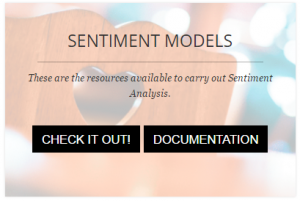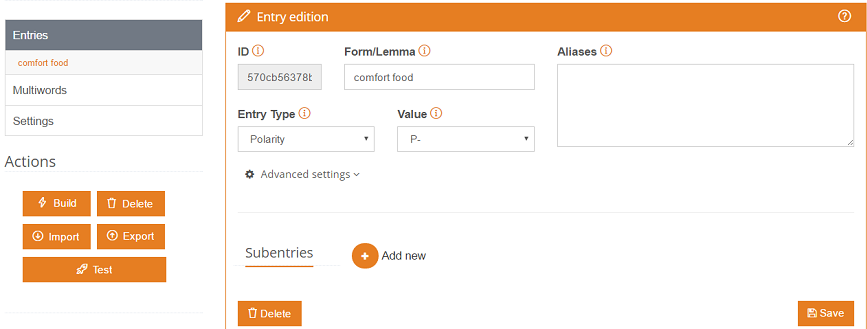The adaptation to the domain is what makes the difference between a good sentiment analysis and an exceptional one. Until now, the possibilities of adapting MeaningCloud’s sentiment analysis to your domain relied on the use of personal dictionaries – to create new entities and concepts that the Sentiment Analysis API employed to carry out its aspect-based analysis – or you had to ask our Professional Services Department to develop a tailor-made sentiment model.
 With the release of Sentiment Analysis 2.1, we incorporated a new customization tool designed to facilitate the creation of personal sentiment models. This tool fully employs our Natural Language Processing technology to enable you to be autonomous and develop —without programming— powerful sentiment analysis engines tailored to your needs.
With the release of Sentiment Analysis 2.1, we incorporated a new customization tool designed to facilitate the creation of personal sentiment models. This tool fully employs our Natural Language Processing technology to enable you to be autonomous and develop —without programming— powerful sentiment analysis engines tailored to your needs.
Other tools for customizing sentiment analysis available on the market, mostly permit to define “bags of words” with either positive or negative polarity. Our tools go far beyond and enable you to:
- Define the role of a word as a polarity vector (container, negator, modifier), allowing to use lemmas to easily incorporate all the possible variants of each word
- Specify particular cases of a word’s polarity, depending on the context in which it appears or its morphosyntactic function in each case
- Define multiword expressions as priority elements in the evaluation of polarity
- Manage how these custom polarity models complement or replace the general dictionaries of every language.

For example, the expression “the interest rate is very high” expressed by a financial service customer may be positive if it refers to deposits, but negative if it has to do with mortgages. With this tool, it is possible to define these different polarities for each case.
And, the use of this tool is included in your MeaningCloud subscription at no additional cost (even in the Free plan).
This sentiment models tool complements our offer for the development of custom semantic resources and contributes to the goal of MeaningCloud of making the highest-quality text analytics available to all developers.

